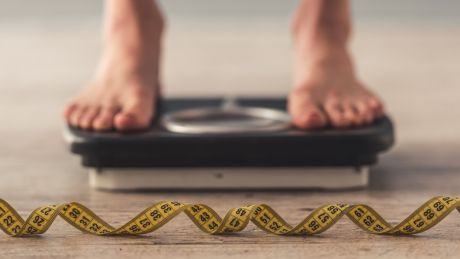Why Classing Obesity As A Disease Might Be A Good Idea
A report by the All-Party Parliamentary Group On Obesity has suggested that the UK takes a serious look at doing this

Figures that show the scale of the obesity problem in the UK make for very grim reading. A World Health Organisation study in 2014 found that 28% of adults were classed as obese and 62% were overweight or obese, based on BMI measurements. Then there are the stats on children in the UK, more than a third of whom leave primary school classed as overweight or obese. On top of the problems it can cause individuals, obesity costs the NHS billions of pounds a year – and the situation is only expected to get worse.
The growing scale of the problem is an indictment of how the UK currently responds to obesity. A new report from the All-Party Parliamentary Group On Obesity has found that on both a personal and organisational level the response to obesity is lacking. According to the report, nine out of ten obese people have suffered abuse, criticism or stigmatisation because of their obesity, and the NHS is failing people with obesity by not offering enough treatment and prevention services.
There is no magic bullet for solving the obesity crisis in the UK, but steps clearly need to be taken. Coach spoke to John Wass, a professor of endocrinology at Oxford University, about what can be done to combat growing obesity rates, starting with the suggestion for government to ensure that a long, hard look at classing obesity as a disease and the effect this would have.
How would classing obesity as a disease help?
It would be really important that people who have an obesity problem are less stigmatised. We used to have a stigma with HIV – we don’t any more. Journalists, the general public and even the medical profession stigmatise people who have a weight problem, and don’t treat them like everybody else. I think if it was a disease people would not think it was their own fault.
I think if you get cancer of the lung, it’s a disease. If you get cancer of the pancreas, it’s a disease. You don’t blame yourself for it. If you have obesity and it’s a disease, you don’t blame yourself and give yourself a hard time. The fact is that genetics are a hugely important aspect of this. If you have an appetite that is above normal or you don’t feel full so quickly as some, you’ll eat more. Those two things are genetically determined.
But self-control also plays a role in obesity?
Obviously there are other things, like the availability of food or the amount of exercise people are taking. It’s not just one thing and I think that’s important too, but unless we begin to tackle things one by one, then we won’t get control of the problem. Our country has the highest levels of obesity in western Europe, some of the highest in the world, and it’s costing the NHS billions of pounds.
Do other places classify obesity as a disease?
In Holland, Portugal, Canada and America it’s classified as a disease. And we know that it has helped in America – it’s helped to destigmatise it and it’s helped to get people treated more readily. There are lots of aspects of making it a disease that will help people that already have a problem.
Get the Coach Newsletter
Sign up for workout ideas, training advice, reviews of the latest gear and more.
How else do you tackle the obesity problem?
There are lots of different things you need to do, but you’ve got to get going. You prevent it, that’s very important, but also treat it. You need to do both of those things.
What should be the first steps?
One of the first steps is to set up obesity services in every hospital in the country. A multidisciplinary team – a physician, a specialist nurse, somebody who can actually help people exercise, a dietitian – all of those things are important. Then people would have somewhere to go when they have a weight problem where they can get treatment. Treatment has been shown to be very effective.
Is the NHS not adequately supporting people now?
Only 50% of the country have access to obesity services, which is nowhere near enough.
See related
Would stopping the advertising of certain foods help?
That’s a preventative measure which is important. Stopping advertising to children before nine in the evening has been shown to decrease the intake of junk foods. Advertising junk food before nine makes the obesity problem worse in children. A fifth of them go into primary school overweight, and a third of them come out of primary school [overweight], so there’s a huge issue there with people putting on weight during their schooling years.
It’s a preventative step that will carry over to when they are adults?
Yes. If a child is overweight they will carry it on as an adult, and they get more incidence of cancer, obviously diabetes, high blood pressure and heart disease.

Nick Harris-Fry is a journalist who has been covering health and fitness since 2015. Nick is an avid runner, covering 70-110km a week, which gives him ample opportunity to test a wide range of running shoes and running gear. He is also the chief tester for fitness trackers and running watches, treadmills and exercise bikes, and workout headphones.
